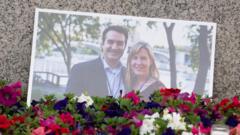Israel's latest operation marks a drastic change in approach by targeting multiple high-ranking officials and experts within Iran, further straining already tense relations.
Escalation in Israel-Iran Hostilities: Major Iranian Figures Assassinated

Escalation in Israel-Iran Hostilities: Major Iranian Figures Assassinated
In a drastic escalation of conflict, Israeli attacks reportedly killed key Iranian military and scientific leaders, signaling a significant shift in tactics.
June 12, 2025, 11:17 p.m. ET — Amid ongoing tensions in the Middle East, Israel has conducted a series of targeted operations within Iran, resulting in the deaths of several high-profile officials. This unprecedented wave of strikes is believed to have successfully killed Hossein Salami, the commander of the Islamic Revolutionary Guards Corps (IRGC), in Tehran, as reported by Iranian state media.
Salami's assassination represents a critical blow to Iran's security framework, especially considering his role in managing Iran's relationships with militia groups such as Hezbollah, a primary adversary of Israel. The operation is reported to have also claimed the lives of other senior figures, including Gholamali Rashid, deputy commander of the Iranian armed forces; noted physicist Mohammad Mehdi Tehranji; and prominent nuclear scientist Fereydoun Abbasi.
Historically, Israel has engaged in targeted killings of Iranian officials but generally focused on individuals outside Iranian territory, mainly in areas like Lebanon and Syria. However, the latest attacks indicate a shift from this conventional strategy to simultaneous strikes that undermine Iran's nuclear capabilities and military leadership from within.
In addition to targeting key figures like the chief of staff of the Iranian armed forces, Mohammad Bagheri, Israeli forces also struck other significant military officials and scientists involved in Iran’s nuclear initiatives. Reports regarding the conditions of those targeted, including Bagheri, remain unconfirmed as Iranian authorities have yet to respond.
This escalation underscores the increasingly volatile interactions between Israel and Iran, raising concerns about potential retaliation and the broader implications for regional stability.
Farnaz Fassihi covers the United Nations and Iran for The New York Times, while Ronen Bergman and Aaron Boxerman report on Israel and Gaza respectively.
Salami's assassination represents a critical blow to Iran's security framework, especially considering his role in managing Iran's relationships with militia groups such as Hezbollah, a primary adversary of Israel. The operation is reported to have also claimed the lives of other senior figures, including Gholamali Rashid, deputy commander of the Iranian armed forces; noted physicist Mohammad Mehdi Tehranji; and prominent nuclear scientist Fereydoun Abbasi.
Historically, Israel has engaged in targeted killings of Iranian officials but generally focused on individuals outside Iranian territory, mainly in areas like Lebanon and Syria. However, the latest attacks indicate a shift from this conventional strategy to simultaneous strikes that undermine Iran's nuclear capabilities and military leadership from within.
In addition to targeting key figures like the chief of staff of the Iranian armed forces, Mohammad Bagheri, Israeli forces also struck other significant military officials and scientists involved in Iran’s nuclear initiatives. Reports regarding the conditions of those targeted, including Bagheri, remain unconfirmed as Iranian authorities have yet to respond.
This escalation underscores the increasingly volatile interactions between Israel and Iran, raising concerns about potential retaliation and the broader implications for regional stability.
Farnaz Fassihi covers the United Nations and Iran for The New York Times, while Ronen Bergman and Aaron Boxerman report on Israel and Gaza respectively.




















